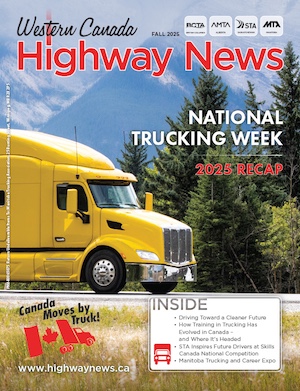Manitoba Trucking Association
With the recent announcement that funding will be dedicated to the trucking industry for a human resources sector council, the Manitoba Trucking Association has been busy on the next steps required to get this off the ground. This includes hiring staff, developing budgets, and determining first steps.
One of those first steps is to look at DEIA, or diversity, equity, inclusivity, and accessibility in Manitoba’s trucking industry. What are our strengths? Where are our challenges? And, most importantly, how do we turn our challenges into opportunities to improve our industry?
One of those items already identified is language diversity. According to Trucking HR Canada:
“Roughly one quarter of Canadian truck drivers and fleet managers have a non-official language as their mother tongue, as defined by Statistics Canada. Of these, most (78% truck drivers and 74% fleet managers) report using a non-official language regularly at work, as defined by Statistics Canada, in addition to one or both official languages. With a current driver workforce of approximately 291,700, based on current Statistics Canada Labour Force Data, this means we have over 56,800 employees using a language other than English and/or French in our workplaces.”1
A few years ago, the MTA began translating industry resources into other languages, including French, Punjabi, Tagalog, and German, prioritizing safety documents produced by RPM: Trucking Industry Safety. This helped to ensure that a broader range of industry participants better understands our safety messages. These translations provide some comfort to many in our industry in knowing that they fully understand safety messages. We all need to fully understand the safe way of completing tasks. While we have work to do, it is our hope that simple steps like this can help.
We are still early on our journey, and we have many more steps to take to address diversity, equity, inclusivity, and accessibility. As noted by Trucking HR Canada:
In trucking and logistics, men make up 85% of the workforce. The ratio of women to men drops even further in certain jobs such as truck drivers (3% female) or technicians and mechanics (1.5% female). In contrast, women account for 87% of general administrative workers, 85% of accounting staff, and 61% of HR staff.2
We know that in Manitoba, there is a wealth of opportunity in our industry. The Province of Manitoba released Manitoba’s Labour Market Outlook for 2022-2026 in March. That report underscores what the Manitoba Trucking Association has been saying for years: there is a huge need for skilled, professional truck drivers in Manitoba. With more openings for truck drivers than for any other occupation, the demand is greater than ever. We need to recruit, train, and retain a new truck driver every eight hours, every day for the next four years, in Manitoba to meet this outlook.
There is also a huge need for truck mechanics and trailer technicians to keep our vehicles operating safely and reliably, with an estimated shortage of approximately 200 workers per year in Manitoba through 2026.
As we all know, trucking is integral to maintaining the smooth flow of goods from producer to consumer. Without the hard work of drivers, mechanics, technicians, and everyone else in our industry, moving goods to local, national, and international markets, our provincial economy would slow down drastically, and shortages would ensue.
Between the provincial Labour Market Outlook and the research findings from Trucking HR Canada, there are clear opportunities in the trucking industry. How do we diversify so we can draw more people into the industry? There are opportunities for women in the trucking industry. Another under-represented group in our industry is Indigenous people. But how do we attract these historically under-represented groups to our industry and into front-line roles such as driver, technician, dispatcher, and warehouse worker? That’s where Manitoba’s new trucking sector council plays a role.
By building on the industry outreach work already done by the Manitoba Trucking Association, the trucking sector council will focus on addressing the gaps and barriers that prevent under-represented groups from joining our industry.
The labour shortage has long been a concern for the Manitoba Trucking Association. With a sector council dedicated to closing the gaps between potential industry participants and current employers, the sky’s the limit for those interested in joining Manitoba’s trucking industry.
References
1 Trucking HR Canada, www.truckinghr.com/driver-language-diversity-building-a-successful-team.
2 Trucking HR Canada, www.truckinghr.com/gender-imbalance-in-trucking-and-logistics.


 1-866-985-9791
1-866-985-9791



